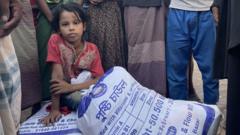When 17-year-old Kajol contracted tuberculosis in January, her family's survival hinged on support from USAID. Now, after the Trump administration's drastic cuts to American aid, her treatment hangs in the balance, threatening her life and those of her loved ones.
Tuberculosis (TB) is a bacterial disease often lethal if untreated, especially in Bangladesh's dense urban areas like slums in Dhaka where Kajol lives. As the family's sole breadwinner working in a garment factory, getting ill was a disaster. However, help came from Dipa Halder, a dedicated worker at Nari Maitree, an NGO that provided free TB testing and treatment funded by USAID—until now.
Since the funding ceased in February, Kajol's recovery has been abruptly interrupted, raising fears of drug-resistant TB strains emerging. Although the Bangladeshi government offers free medications, many like Kajol find it tough to access necessary treatments, highlighting the support's essential role.
USAID is recognized for combating TB effectively; a 2023 report stated over 250,000 new TB cases were detected, driving down mortality rates significantly. But as funding plummets from $500 million to $71 million, local programs close down, and Dipa, too, lost her job. “I feel completely shattered,” she shared, burdened with her family’s needs.
The cuts extend beyond individual families and threaten the entire humanitarian framework in Bangladesh, already reeling from political instability and economic challenges. Reports indicate about 113 USAID-supported programs gripped by funding termination, potentially resulting in the loss of hundreds of thousands of jobs in the NGO sector that employs half a million people.
The impact is starkly visible in Cox's Bazar, home to over a million Rohingya refugees, a group in dire need of international aid. Without USAID's funding, vital healthcare services diminished, leading to health crises, including a surge in cholera outbreaks.
Aid agencies warn of looming disaster; families like Rehana Begum’s are left with ration cuts from the World Food Programme, forcing them to face insurmountable hardships. As funding shortfalls tighten the noose, experts raise alarms: “This is an absolute disaster in the making,” cautioned a UNICEF representative.
As communities confront a future filled with uncertainty and challenges, the call for renewed international support grows louder, emphasizing the dire consequences of these funding cuts in Bangladesh's battle against poverty and disease.























